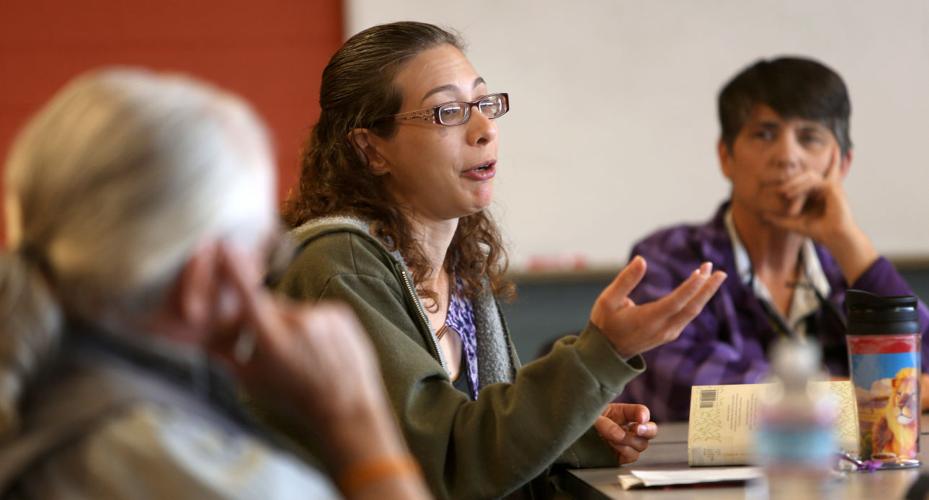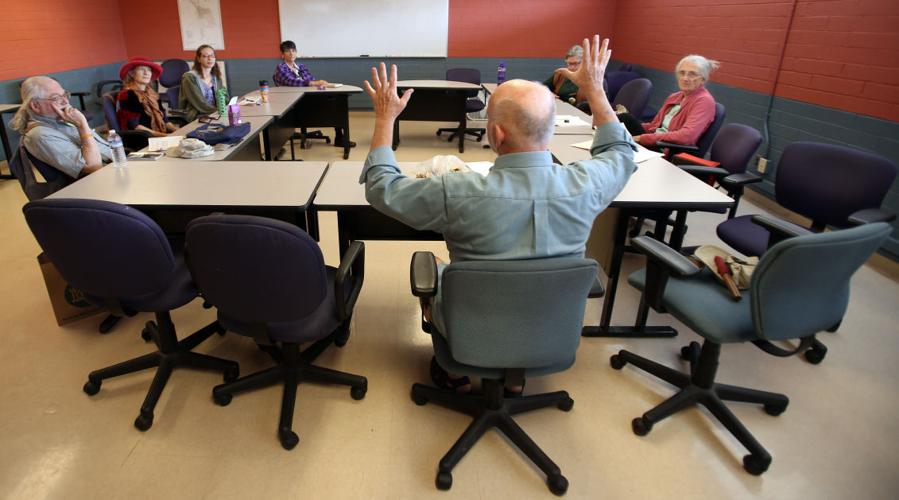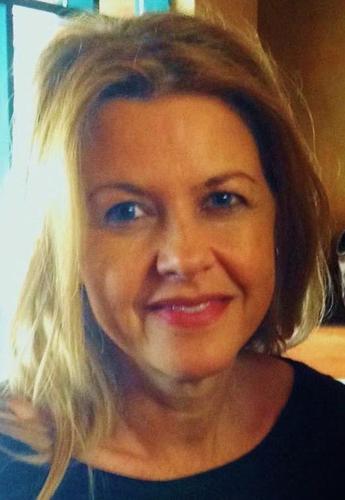Teresa Cowan Jones has vivid memories of her grandmother’s prayer life — powerful, constant and real.
Going to her grandmother’s Pentecostal Holiness church made her uncomfortable, and yet the older woman’s relationship with the divine impressed her.
“My grandmother had a lived experience of divine reality ... and I saw how it sustained her and gave her life in so many ways,” says Jones, an ordained United Church of Christ minister. “It made me want to seek, what is prayer? What is meditation? What are these practices that she does?”
There is the essence of Sacred Space, a weekly gathering Jones started about two years ago as a project of her Breakthrough Leadership Institute to explore the world’s wisdom traditions.
Like so many other Americans who grew up in church, Jones, 47, found herself dissatisfied with the institution. Her Methodist church in the South didn’t offer the rich spiritual life she saw in her grandmother. With a burgeoning interest in mysticism, she also felt at odds with the faith tradition of her childhood, though she never abandoned it completely.
The 2014 Religious Landscape Study by the Pew Research Center reported that about 18 percent of American adults now identify as religious “nones” — atheist, agnostic or “nothing in particular” — after being raised in a faith tradition. And yet for many, spirituality remains important.
That’s where Sacred Space fits in, says Hester Oberman, the president of the American Academy of Religion, Western Region and a religious studies lecturer at the University of Arizona.
“It speaks to the 21st-century movement that people feel spiritual but not religious and don’t feel connected to institutional religion,” Oberman says. Sacred Space “really tries to speak to the richness of tradition and connect people to that, harnessing the spiritual without being a dogmatically religious institution.”
WEEKLY GATHERINGS
At Sacred Space’s Sunday night gatherings and weekly small groups, participants can engage in discussions about life’s big questions and enjoy a sense of community without committing to one doctrine.
“It’s allowing us to get together for live support for life’s journey, to have a place to dialogue and test assumptions,” Jones says. “It’s a place to be challenged and test what is truth.”
Every Sunday night, about 40 people gather in the Ward 6 office to listen to live music and learn about a contemplative practice.
Jones defines that as “anything that helps you move inward.” Many of the speakers at Sacred Space discuss religion and spirituality traditions, but a contemplative practice can also include gardening or reading.
“It’s a very eclectic spiritual group,” says Steve Kozachik, the Ward 6 city councilman who occasionally drops in during the meetings. “It’s a group of people who are mutually searching for the calm in the eye of the storm, and they really find it together, too.”
Those who come want to learn. Perhaps they identify as secular or are torn between multiple faiths. Others may have scars left over from organized religion. And still others may hold to a faith tradition but want to meet believers of another kind.
Jones graduated from Vanderbilt University in 1996 with a master of divinity degree. She intends for Sacred Space to be a free resource for those interested in wisdom traditions, who don’t want to pay for a degree, hire a guru or book a retreat.
“Each week, everything is meant to cultivate compassion and increase self-awareness,” she says. “To familiarize ourselves with a story or tradition different from our own. We look at personal, cultural and spiritual narratives, stories of what it means to be human.”
Sacred Space tries to consistently host speakers from its faith partners, including Temple Emanu-El, the Southwest Conference of the United Church of Christ, the Muslim Community Center, Zen Desert Sangha and Desert Ashram.
SHARING ideas, taking deeper look into beliefs
Jones wanted to provide participants with an easy way to look deeper into any one faith, though she acknowledges that not all believers will agree with a model that integrates secular and interfaith traditions.
Rula Khalidi, a member of the Muslim Community Center’s interfaith committee, shared her experience as a Muslim woman at a recent gathering.
“I’m here sharing my philosophy, and when other people share theirs, I may not agree with everything, but it opens me to understanding my own belief system better,” she says. “It makes me challenge my own belief systems and appreciate my own systems in new ways.”
For Brian Taraz, who found Sacred Space in its early days, the group actually allows him to better practice his Bahá’í Faith, which teaches oneness among religions and humanity.
“One of the cultural tenets is unity and diversity and consorting with followers of every religion,” says Taraz, who has also shared at the gathering. “That can be tricky to do with a brand name of your community, even if your intentions are good.”
Sacred Space, with no particular affiliation, has made that easier.
“It’s a place for people to share their own investigation or personal spiritual biography and to give them a place where that pursuit is recognized and respected,” says Diane Call, a friend of Jones’ who was part of the core team at Sacred Space and has since presented about her Kundalini Yoga practice.
Unlike Unitarian Universalism, which has a similar, multifaith premise, Sacred Space has no membership roster.
Donations and about $77,000 in grant money from the Southwest Conference, the national United Church of Christ and Saguaro Christian Church fund the experiment, Jones says.
She pays one staffer an hourly wage, and says she has not taken personal pay in months.
“I wanted to create a model that supports spiritual development that doesn’t require a building or salaried person,” says Jones, who makes her living as a leadership and personal-development coach. “I created this to be low-cost.”
COMPASSION IS THE CORE
As a former associate pastor at First United Methodist Church and later as a campus minister at the UA, Jones experienced firsthand the difficulty of balancing the business of running a church and the pursuit of spiritual growth.
The model has piqued the interest of Charter for Compassion International, a nonprofit organization that encourages cities to set up action plans that address local concerns while still celebrating that city, says Marilyn Turkovich, the director of the Washington-based nonprofit.
About 350 cities around the world have connected with the Charter for Compassion. Tucson is among about 70 cities that have already affirmed the charter by setting up an action plan last April. Jones led the charge, because compassion — not warm, fuzzy feelings, but actual action to help others — is the core of Sacred Space, she says.
And so the Charter for Compassion approached Jones about possibly helping people in other cities replicate the Sacred Space model as a way to promote dialogue, Turkovich says.
Jones is open to the idea, but says the success of Sacred Space depends on the place and the people who come, not on its founding director or on a formula.
“I wanted a place like this all my life,” she says. “That’s what keeps me going.”







